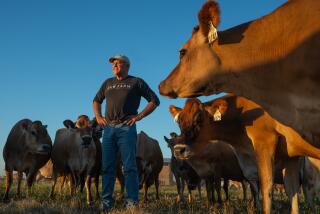Britain Minimized ‘Mad Cow’ Illness, Report Says
- Share via
LONDON — With a policy of “sedation,” the British government misled the public for years about the threat of fatal “mad cow” disease spreading from cattle to human beings, according to an official report released Thursday.
The former Conservative Party government did not deliberately lie to Britons about bovine spongiform encephalopathy, or BSE, the report said. But in an effort to prevent consumer panic and to protect British beef exports, Cabinet ministers and civil servants undertook a “campaign of reassurances [that] was a mistake” and often not firmly rooted in fact.
As the results of a 2 1/2-year inquiry were published, Prime Minister Tony Blair’s Labor government announced that it will set up a fund to compensate victims of the human form of mad cow disease.
According to the latest figures, 77 people have died of the disease and seven others are known to be infected. But because of the illness’ lengthy incubation period, the report noted that “families all over the U.K. have been left wondering whether the same fate awaits them.”
The 16-volume anatomy of the BSE epidemic is an indictment of the government’s culture of secrecy and unwillingness to trust its people with information about food and health safety.
The origin of the BSE plague may never be known, the report says, although it is believed that cattle may have been infected as long ago as 1970. It is also not known exactly how the disease jumped the species barrier from animals to humans.
But the report says the practice of recycling parts of beef not sold as meat, such as the spine, into cattle feed allowed BSE to develop into an epidemic.
Nearly a decade passed between the December 1986 confirmation of the first cases of BSE in British cattle and the government’s announcement in Parliament on March 20, 1996, that 10 young people had contracted a new variant of BSE.
During that 10-year period, “officials and ministers followed an approach whose object was sedation,” the report concludes.
The government routinely assured the public that there was “no evidence that BSE can be transmitted to humans” and that it was safe to eat beef, the report said. In 1990, then-Agriculture Minister John Gummer went so far as to hand his 4-year-old daughter a hamburger in front of the cameras to demonstrate his confidence in British beef.
“Caught in a ‘no-win’ situation, he chose the wrong option, but it is not a matter for which he should be criticized,” the report says of Gummer’s efforts to defend beef.
The report largely avoids criticizing individuals. Instead, it shows a pattern of government ministers and civil servants acting too slowly, failing to ensure that announced safeguards were implemented, and playing down risks in the face of growing evidence to the contrary.
“The government introduced measures to guard against the risk that BSE might be a matter of life and death not merely for cattle but also for humans, but the possibility of a risk to humans was not communicated to the public or to those whose job it was to implement and enforce the precautionary measures,” the report says.
The government learned at the end of 1987 that cattle feed containing cattle parts was causing the spread of BSE and imposed a ban on the use of such feed, but it gave farmers a five-week grace period, allowing thousands more cattle to be infected. Even then, some farmers continued to use the feed.
Departments also failed to inform each other of new information. Agriculture Ministry officials learned in 1987 that there was a risk that BSE might be transmitted through veterinary products, but they failed to share their concerns with Health Department officials responsible for handling human medicinal products that also could have been affected.
The Conservative Party’s agriculture spokesman, Tim Yeo, apologized for the BSE plague, which spread during his party’s time in power.
Some families of BSE victims said the report treads too softly on government officials. They welcomed the apologies and the fund established Thursday but said nothing could compensate for the pain they had suffered.
“My son is dead,” said Frances Hall. “Ideally, I’d like to see heads on sticks on Tower Bridge. But realistically, that was never going to happen.”
Hall, whose son Peter, 20, died in 1993, and who helps run a crisis telephone line on BSE, applauded the fund to help BSE families. “I have new families all the time who are going through hell,” she said. The victims “deserve to die with as much dignity as possible.”
More to Read
Sign up for Essential California
The most important California stories and recommendations in your inbox every morning.
You may occasionally receive promotional content from the Los Angeles Times.













